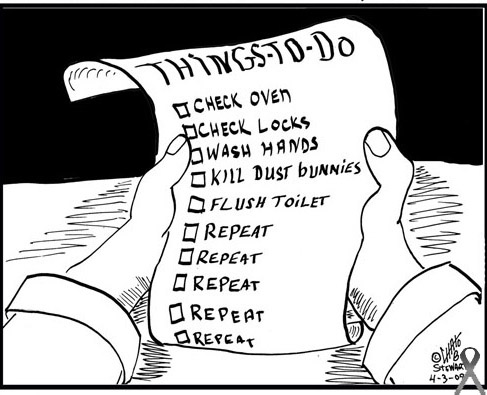OCD... or not!
/“You’re so OCD!” and other myths of OCD - by Patience Domowski, LCSW
“OCD” stands for “Obsessive Compulsive Disorder.” It’s a real anxiety disorder that is often misrepresented. Many people think they know someone with this disorder but it’s really not this.
What it is:
A person with OCD has to do specific behaviors in order to counter upsetting thoughts or to keep something ‘bad’ from happening. They may have a specific bad thing they think will happen or just a general anxious feeling.
Often these thoughts revolve around germs, dirt, needing things organized or a certain way, counting steps or other things. Sometimes they can’t remember if they completed a certain action. Their brain doesn’t say ‘it’s done’ but has to be done over and over or worries that they didn’t do something.
Sometimes the action they feel they have to complete isn’t related to the anxiety they are trying to avoid.
The behaviors are compulsory and ritualistic. They usually realize what they are doing isn’t ‘normal’ but don’t seem to be able to stop it.
Examples: The person has to wear red socks to school in order to not get a bad grade. The person has to tap the door 3 times or something terrible will happen that day. The person has to check that they turned the stove off over and over or close a door 5 times because their brain says it wasn’t completed.
What it is NOT:
Often people say they think they have OCD or someone they know has OCD because they are a perfectionist, very neat, like things a certain way, enjoy routines and desire order, especially with items in their home. However this is not ‘OCD” unless those behaviors are to counteract negative thoughts. Also some behaviors that someone does over and over like their brain gets stuck on one thought or action is more perseverating or idiosyncratic behaviors that aren’t necessary OCD. So if they say the same phrase over and over or turn their hands a certain way constantly it’s not necessarily OCD unless they are trying to counteract anxious thoughts and these behaviors are relieving that feeling of something bad happening.
OCPD is Obsessive Compulsive Personality Disorder.
OCPD varies from OCD in it’s a personality disorder and affects several domains of their life but they don’t think it’s a problem usually. The person has a very specific “right way” to do things, very rigid with rules and order, they are more about concerned with following the itinerary than having fun, they are very stuck on doing regular things a certain way all the time. Examples of someone with OCPD on TV includes: Danny Turner from Full House, and Sheldon Cooper on Big Bang Theory (in my opinion). [Sheldon also has Aspergers].


